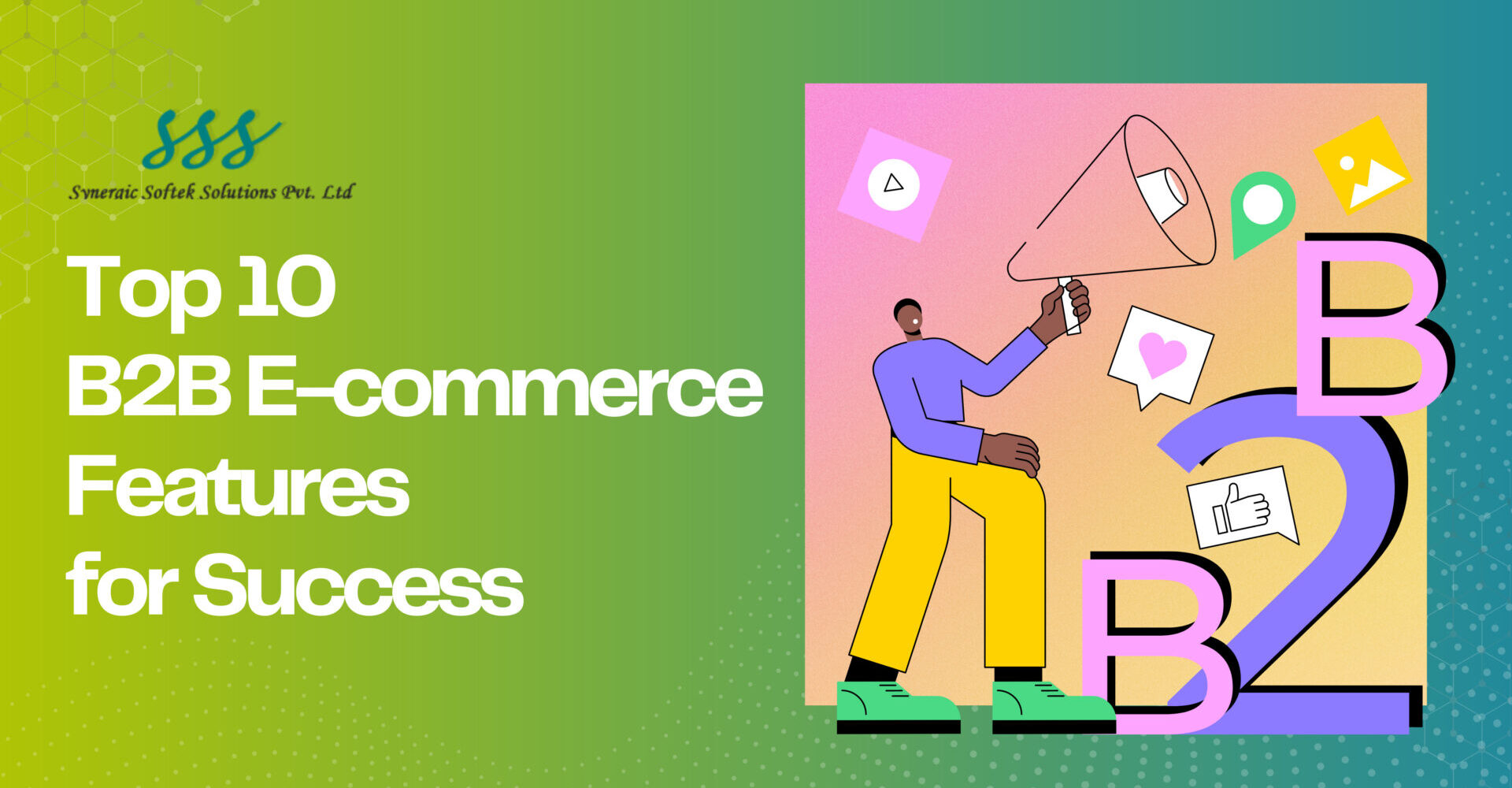
Top 10 B2B E-commerce Features for Success
In the rapidly evolving digital landscape, businesses are increasingly adopting e-commerce solutions to streamline their operations, enhance customer experiences, and drive revenue growth. In the B2B (Business-to-Business) sector, e-commerce platforms have become instrumental in facilitating transactions between businesses, improving efficiency, and fostering lasting relationships with clients.
B2B sales have become increasingly dependent on e-commerce. Even though B2C e-commerce gets most of the attention, the global market for B2B Business is five times larger and bigger continuously. The global B2B e-commerce market is expected to reach $20.9 trillion by 2027. This means that there is a large and growing market for B2B e-commerce businesses. Clearly, modern B2B e-commerce platforms offer merchants plenty of opportunities for growth. Through B2B e-commerce platforms that provide the right features, merchants can optimize customer experience and improve customer journeys.
Although many B2B companies are aware of the benefits of having an e-commerce website, some still prefer to use more traditional methods, such as phone or email, to process transactions. However, running wholesale and reseller transactions through an e-commerce website offers simplicity for customers and time-saving benefits for B2B organizations, leading to increased sales. Selecting the right e-commerce solution is critical for the success of a B2B online venture, as not all platforms are suitable for B2B transactions. To be considered as B2B platforms and effectively cater to B2B shoppers, e-commerce solutions should provide the Top 10 features which we are going to discuss in this article.
The Importance of a Successful B2B E-commerce Platform
In today’s digitally-driven business landscape, the significance of B2B e-commerce platforms has surged to new heights. As businesses seek ways to streamline operations, enhance customer experiences, and expand market reach, successful B2B e-commerce platforms have emerged as indispensable tools for achieving these objectives. Gone are the days of archaic transactions conducted via phone or email; the power of B2B e-commerce lies in its ability to revolutionize the way businesses buy and sell goods and services.
A successful B2B e-commerce platform goes beyond mere online selling capabilities. It embraces customization, personalization, and seamless integration with enterprise systems, empowering businesses to cater to individual customer needs while improving efficiency and reducing costs. The data-driven insights generated by such platforms enable businesses to make informed decisions and pivot their strategies to meet ever-changing market demands. Before you invest in building a B2B platform, you need to know about the features to build a successful e-commerce site.
In this dynamic landscape, the importance of a successful B2B e-commerce platform cannot be overstated. It not only opens doors to new market opportunities but also fosters stronger relationships between suppliers and buyers.
Core Features of B2B E-Commerce Platforms
A powerful B2B eCommerce platform should go beyond basic online selling capabilities and offer a comprehensive suite of features to meet the unique needs of B2B transactions. Here are top 10 key features that make a powerful B2B eCommerce platform:
1. Customer-specific catalog and pricing:
B2B businesses need to be able to offer different prices and products to different customers. This is because different customers have different needs and requirements. For example, a business that sells office supplies might offer a different price for a box of pens to a small business than it would to a large corporation.
There are a few different ways to implement customer-specific catalogs and pricing. One way is to create different customer groups. For example, a business might create customer groups for small businesses, large corporations, and government agencies. Each customer group would have its own set of prices and products.
Customer-specific catalogs and pricing are valuable features for B2B e-commerce platforms. By offering different prices and products to different customers, businesses can increase their sales and improve customer satisfaction.
2. Volume purchase and bulk discounts:
B2B businesses often sell products in bulk, so it’s important to offer volume purchases and bulk discounts. This encourages customers to buy more products and save money. You can implement volume purchases and bulk discounts to offer free shipping on orders over a certain amount. This is a great way to encourage customers to buy more products, especially if they are located in different parts of the country or world.. By offering these discounts, businesses can increase their sales and improve customer satisfaction.
3. Seamless integration with enterprise systems:
One of the key features of a successful B2B e-commerce platform is its ability to seamlessly integrate with existing enterprise systems, such as Enterprise Resource Planning (ERP), Customer Relationship Management (CRM), and Inventory Management systems.
A successful B2B e-commerce platform’s seamless integration with enterprise systems plays a crucial role in optimizing business operations. The real-time data synchronization and elimination of manual data entry errors result in improved efficiency, accuracy, and overall performance. Businesses can provide better service to their customers, leading to enhanced customer experiences and stronger relationships. With streamlined operations, a successful B2B e-commerce platform empowers businesses to focus on growth and strategic initiatives, driving long-term success in the competitive B2B marketplace.
4. Robust order management:
It is a vital feature of a successful B2B e-commerce platform. It streamlines the complexities of B2B transactions, simplifies the ordering process for customers, and ensures end-to-end visibility for businesses. With efficient order management, businesses can improve operational efficiency, reduce fulfillment errors, and deliver exceptional customer service, enhancing their reputation and positioning themselves for continued success in the competitive B2B market.
A successful B2B e-commerce platform provides real-time updates on order status, from initial placement to final delivery. Businesses can monitor order progress, shipping details, and any potential delays, empowering them to proactively address issues and meet customer expectations.
5. Secure payment and checkout options
In the B2B landscape, transactions often involve substantial amounts of money. A successful B2B e-commerce platform prioritizes security by offering secure payment gateways that safeguard sensitive financial information during online transactions.
The platform integrates with reputable payment processors and encryption technologies, ensuring that all payment data is encrypted and protected from unauthorized access. The implementation of secure and flexible payment options contributes to the platform’s reputation as a trusted and reliable B2B marketplace, positioning it for continued success in the competitive digital business landscape.
6. Aware of the latest e-commerce trends:
Staying aware of the latest e-commerce trends is vital for a successful B2B platform. It ensures market relevance, meets customer expectations, and provides a competitive advantage. Embracing new technologies and optimizing for mobile devices enhances user experience, while personalization and data-driven decisions foster customer engagement and growth.
Adopting omnichannel marketing and streamlining supply chain processes improve efficiency. Social media integration builds brand awareness, and understanding customer behaviors enables targeted strategies. By keeping up with trends, B2B platforms can stay adaptable, establish industry leadership, and achieve long-term success in the dynamic digital landscape.
7. Aware of tax exemption status:
Some B2B customers are exempt from paying sales tax. It is important to have a system in place to track tax exemption status and ensure that customers are not charged sales tax when they are not required to pay it. For example, a B2B platform could allow businesses to enter their customer’s tax exemption status into the system. This would ensure that customers are not charged sales tax when they are not required to pay it.
8. Product reordering capability:
B2B customers often purchase the same products repeatedly. It is helpful to have a system in place that allows customers to easily reorder previously purchased products. For example, a B2B platform could allow customers to create a “saved cart” of products that they have previously purchased. This would allow customers to easily reorder these products without having to search for them again.
9. Minimum order quantity
B2B customers often purchase products in bulk, so it’s important to set a minimum order quantity. This helps businesses to avoid having to process small orders that are not profitable. By setting a minimum order quantity, businesses can increase their efficiency. This is because businesses can avoid having to process small orders that are not profitable. It helps businesses reduce their costs. This is because businesses will not have to process as many small orders.
10. Quote feature
The “request a quote” feature is crucial in B2B settings as it allows businesses to get personalized pricing based on their specific requirements, promotes transparency in pricing, enhances communication between buyers and sellers, and helps generate valuable leads for the business. The introduction of this feature would be better suited if you have a complex ordering process or a large number of orders. It enables a more flexible and adaptable buying process, catering to a wide range of products and services, ultimately leading to more successful and mutually beneficial transactions.
Conclusion:
A successful B2B e-commerce platform is built on the foundation of essential features that empower businesses to thrive in the digital marketplace. Embracing these top 10 features enables B2B e-commerce platforms to stay ahead in the ever-evolving business landscape and create lasting partnerships between buyers and sellers, propelling mutual success for years to come. However, there is another option if you don’t feel like getting any headache from it. You can contact us, the most promising e-commerce solutions provider to make your dream come true. But if you like to read our articles, keep your eye on our blog page.


